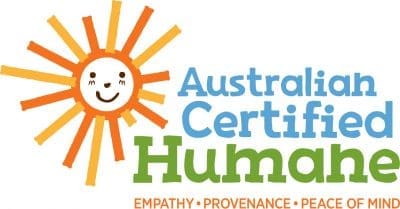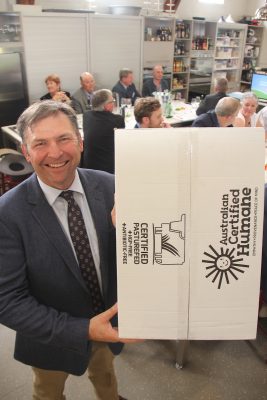It is no secret that more consumers are taking an interest in how the animals that provide their food are raised.
Alisdair Robertson witnessed this growing trend through his years as a butcher, beef retailer, restaurateur and now as a wholesaler.
He says there is clear consumer demand for beef that is backed by certified humane-raising standards, in the same way that RSPCA approved chicken is satisfying a distinct and growing consumer niche.
However, when he tried to secure a consistent supply of quality grassfed beef underpinned by an independent certified welfare standard for his wholesale business Butcher’s Nook, he was unable to.
Nor could he find any evidence of industry-backed programs for welfare certification under development or soon to be launched.
 So, in order to give customers what they want, he set about establishing own program.
So, in order to give customers what they want, he set about establishing own program.
This week he launched Australian Certified Humane, a third-party auditing and licensing program for humanely-raised grassfed beef cattle.
His wholesaling business Butchers Nook sells beef from a range of brands underpinned by the Pasturefed Cattle Assurance System (PCAS), with a strong focus on brand provenance and raising history.
‘I thought for a long time a platform was required where we could attach a really great product in PCAS to a welfare certification’
“I thought for a long time a platform was required where we could attach a really great product in PCAS to a welfare certification,” Mr Robertson said.
“Our aim is to get traction for this welfare standard through our wholesaling business.”
PCAS accredited producers can pay a $1 fee to sell through the Butcher’s Nook supply chain and under the Australian Certified Humane logo.
Mr Robertson said participating producers will receive a 50c/kg premium on top of the standard PCAS rate.
In return the producers must agree to have their brand and production story, with video and backed by traceability documentation (NVD, Waybill, PCAS certification), shared at retail level.

Rolleston, Qld, cattle producer and one of the drivers of the Pasturefed Cattle Assurance System, Ian McCamley, addresses the launch of Australian Certified Humane in Toowoomba.
Regulations underpinning the Australian Certified Humane system include:
Licensing and audit: Each production site must be inspected three times and audited by a representative of Australian Certified Humane prior to licensing.
Licensed properties are re- inspected every six months.
Australian Certified Humane rules: Participating producers are required to observe the existing welfare standards outlined in the Australian Animal Welfare Standards and Guidelines for Cattle, which were endorsed in January 2016.
In addition to this, the program requires producers to demonstrate evidence of the following:
- That the herd composition is polled or moving towards a polled herd through bull and female selection
- The use of appropriate castration rings and audited surgical castration )t confirm most up to date methods are being used, that the producer is at the forefront of pain minimisation practices, and will willingly consider new technology and advances as they are developed and endorsed by the scientific and veterinary communities)
- Adequate water infrastructure is in place to maintain good animal health
- Confirmation that management has an adequate drought management strategy in place
- Restrictions of movement of cattle south of the Brisbane line to north of the Charters Towers line
Instead of dentition the system uses ‘quarter of birth’ via management tag or other identifier.
The following video has also been launched to explain the Australian Certified Humane program:
ACH Explainer Video from Driven on Vimeo.
For more information visit the Australian Certified Humane website here


Without wanting to deter from any of the good work done by all of the above, and looking further into the future, once we have all this humane stuff in place to everyone’s satisfaction, including all those Syd Morn Herald latte sipping readers, can we start concentrating on the humane treatment of our every day ‘spud’ (potato, papa, or what ever). Yes, I know it is a long way off our beef industry, and I fully support good animal husbandry/treatment, but my concern is for the barbaric treatment the common spud (alive and growing) gets. Being either peeled completely of it’s outer skin while still alive, or worse put straight into boiling water, by those too lazy to peel it. I hope I am not showing too much of my frustration on all the wasted time we are experiencing due to external pressures. Anyway ‘numbspuds’ to youse all!!
Evening Michael, I probably just need to clarify that I am not ‘from within industry’ , so am certainly not trying to run down or undermine what you obviously see as a great program in Grazing BMP. And the blokes who were involved in getting that set up / off the ground have not been a part of getting Australian Certified Humane off the ground. So I wouldn’t get too disheartened by one hand of industry not knowing what the other is doing, because I certainly don’t represent any industry body or anyone from within industry. I just want to work with it. And am happy to speak to any Grazing BMP producer, and provide that link to the consumer that you talk about. Again, happy to talk to anytime if you want to give me a call / email 0437 261 067 / alisdair@auscertifiedhumane.com
Evening Hugh, I would suggest that you know very little about what Australian Certified Humane involves (aside from what is in this very brief article), so perhaps leave the jury out for a while, and I am happy to discuss at any time the requirements for the certification (including freight to processing point / processing procedures etc). 0437 261 067, AR
This article is really disappointing to see given the incredibly hard work the Grazing BMP team has carried out over the last five years in Australia.
Initially from Queensland – the Grazing BMP now has 1700 graziers across Australia looking for market opportunity (and can independently prove their performance) yet the links between industry – market and consumer – haven’t been made by our industry leaders.
This is a great example of one hand of the industry not knowing what the other hand is doing.
To read in this article that there is no programme available – and none near completion in Australia is absolutely disheartening – especially when PCAS – is being ran by the guy who has approved the early years of Grazing BMP development.
Talk about the blind leading the blind!
Grazing BMP has both a voluntary self assessment for producers to understand the required level of performance the industry expects – it also has a third party ISO recognised and independent audit carried out by SGS.
The Grazing BMP programme has support for the process from RSPCA – so all in all – the programme was a turn key programme for markets such as announced here that not only address ethical production – but also environmental parameters too!
So to rub some more salt into the wound – for PCAS – who have been routinely briefed about the opportunity Grazing BMP offered the market niche – and even has supported 10 graziers meld their PCAS audit and BMP audit into one accreditation and Cattle Council (also routinely briefed on the benefits) being owners of PCAS and ran by Howard Smith – who was the original owner of Grazing BMP to not link the dots and provide this link really underscores the inability of this industry to perform in the best interest of its members – and its customers.
A house divided against itself cannot stand
M
Nothing about how the animals are routinely. Can still be kicked, yelled at, and hit with plastic pipes in order to get them to move from A to B?
Nothing about how they are slaughtered or transported to slaughter?
Seems like there’s plenty of room to treat them inhumanely despite this certification. I’m happy this exists, but it should be stronger.